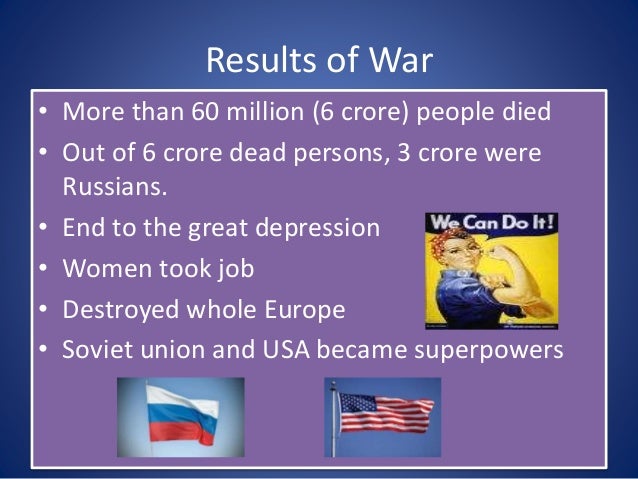3 Results Of Ww2
Before the Second World War started Britain imported about 55 million tons of food a year from other countries. Understandably, the German government did what they could to disrupt this trade. One of the main methods used by the Germans was to get their battleships and submarines to hunt down and sink British merchant vessels. With imports of food declining, the British government decided to introduce a system of rationing. This involved every householder registering with their local shops. The shopkeeper was then provided with enough food for his or her registered customers.
World War II was fought between the Axis Powers (Germany, Italy, Japan) and the Allied Powers (Britain, United States, Soviet Union, France). Most of the countries in the world were involved in some way. It was the deadliest war in all of human history with around 70 million people killed.
In January, 1940, bacon, butter and sugar were rationed. This was followed by meat, fish, tea, jam, biscuits, breakfast cereals, cheese, eggs, milk and canned fruit. Rationing was popular with the people and a Gallup Poll showed over 60 per cent in favour of this system.
- Over 36 million World War II draft registration cards from multiple registrations filled out by men aged 18–44. U.S., World War II Draft Registration Cards, 1942 Over 10 million draft cards of men aged 45-65 who registered for the fourth WWII draft in 1942.
- In World War II, the three great Allied powers—Great Britain, the United States, and the Soviet Union—formed a Grand Alliance that was the key to victory. But the alliance partners did not share common political aims, and did not always agree on how the war should be fought.
- World War II changed the lives of many Americans. War industries sparked urban growth. Many states became boomtowns and adjusted their common way of living to benefit the war. In Detroit, the automotive industries switched from manufacturing cars, to building war machinery.
- What are the positive and negative effects of World War 2. It is often hard to consider the positive effects of any war, since the war by definition results in large-scale destruction of human life, industries, economy and society as a whole.
However, many small shopkeepers complained about the strategy used by food inspectors of employing people to encourage the breaking of the law. In December 1940, Isabella Tompsett was employed in Stepney to visit butchers' shops and attempt to buy meat without coupons. As a result three butchers in one road were heavily fined for this offence. These undercover officials acting as agents provacateurs, were severely criticised in the press.
Food inspectors in Hendon were also criticised for using a team of women who tried to trick shop assistants into selling goods without coupons. The scheme involved the customer handing over her ration book and asking for two ounces of tea. When the shop assistant had almost finished serving her, the customer changed her mind and asked for four ounces. If the shop assistant forgot to take out a second two ounce coupon, they would be charged with breaking rationing restrictions. In a short period 59 Hendon shopkeepers were successfully prosecuted for this offence.
It was announced that in March 1941, under the Food Control Order, the system of rationing, 2,141 prosecutions were brought and there were 1,994 convictions, a success rate of 93.1 per cent. The following month this had increased to 2,300 prosecutions and 2,199 convictions (95.6 per cent). The General Secretary of the National Association of Outfitters complained that small traders had become the 'most persecuted class in the whole of the country'.
3 Results Of Ww2 Bombers
In the summer of 1940 the government established a committee of nutritional experts to advise the War Cabinet on food policy. The committee issued a report claiming that each citizen could survive on twelve ounces of bread, a pound of potatoes, two ounces of oatmeal, an ounce of fat, six ounces of vegetables and six-tenths of a pint of milk per day, supplemented either by small amounts of cheese, pulses, meat, fish, sugar, eggs and dried fruit. Winston Churchill was concerned by the implications of this proposal and the advice was not published.Some people considered food rationing to be very unfair. Eggs, butter and meat could be obtained fairly easily without coupons in rural areas. By the summer of 1941 greengrocers were taking their lorries into the country to buy vegetables direct from growers.
The open-air markets at Romford soon developed a reputation for being a good place to buy black market goods. Traders relied on tic-tac men to signal the approach of the police or known trading inspectors. Local newspapers published stories of market-traders doing a great trade in selling goods without coupons.
Another strategy at Romford was for traders to sell new clothes labelled as 'second-hand' or 'shop-soiled'. For example, a secondhand suit could be sold without coupons providing the price was not more than £2 12s.
By using undercover inspectors the government gradually got Romford market under control. However, the situation deteriorated when over 100,000 ration books were stolen from the Ministry of Food offices in Romford. Valued at being worth over £500,000, these were quickly sold to people wishing to buy goods legally from the market.
(If you are enjoying this article, please feel free to share. You can follow John Simkin on Twitter and Google+ or subscribe to our monthly newsletter)
The Food Control Officer in Brighton discovered that 80,000 ration books had been stolen from the Royal Pavilion (Brighton Food Office). An undercover policeman eventually agreed to buy the missing ration books. When the gang was arrested it was discovered the ring-leader was the Woman Enforcement Officer at the Brighton office who had reported the theft. She was later sent to prison for three years.
In August 1940 the government passed legislation that made the waste of food a prisonable offence. One of the first to be prosecuted was J. Lyons Ltd who was fined for allowing mice to eat food in its kitchens.
It was also an offence for restaurants to serve fish and meat at a single sitting. When the Odean Theatre in Streatham was found guilty of this offence, the manageress and two of her waitresses were fined for 'aiding and abetting the serving of both meat and fish to an assistant enforcement officer'.

The government announced in September 1939, that petrol was rationed. Initially small allowance of petrol was allowed for private motorist but this was brought to an end in the summer of 1942 after the Japanese Army occupied Malaya and the success of the U-boat attacks on the Atlantic convoys.
Ivor Novello, the songwriter, was sent to prison for eight-weeks after he had fraudulently obtained petrol for his Rolls-Royce car. His friend, the actor and playwright, Noel Coward, was convicted for currency racketeering. Another high profile conviction concerned Major-General Sir Percy Laurie, the Provost Marshal of Great Britain. He was found guilty of illegally obtaining a second ration book.
Other goods such as cigarettes and alcohol were never officially rationed, but were often in short supply. Some shopkeepers kept their limited stocks for their favourite customers. This created a great deal of bad feeling and it was not uncommon for shopkeepers to be reported to the Ministry of Food.
Children were treated differently from adults and were entitled to extra foods considered essential for growth, such as milk and orange juice. The National Milk Scheme provided one pint of milk for every child under five. Expectant mothers and young children were entitled to free milk if the combined income of parents was less than 40 shillings a week.
The food rationing system gave people the opportunity to obtain a balanced diet and as a result the health of the nation improved during this period.
3 Results Of Ww2 War
People were encouraged to provide their own food. The government's Dig for Victory campaign called for every man and woman to keep an allotment. Lawns and flower-beds were turned into vegetable gardens. Chickens, rabbits, goats and pigs were reared in town gardens.
Clothing was rationed from June, 1941. A points system allowed people to buy one completely new outfit a year. To save fabric, men's trousers were made without turnups, while women's skirts were short and straight. Frills on women's underwear were banned.
Women's magazines were packed with handy hints on how, for example, old curtains might be cut up to make a dress. Stockings were in short supply so girls coloured their legs with gravy browning. Sometimes a friend would draw a line down the back of their legs with an eyebrow pencil for a seam.

Three Results Of Ww2
In May 1943, the annual clothing coupon allowance was cut from 48 to 36 per adult. Later this number of coupons was cut to 20. When one considers that a coat needed 18 coupons this reduction caused serious problems for people.